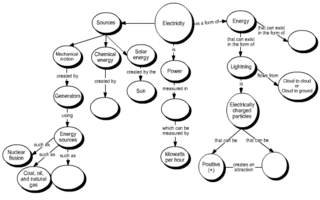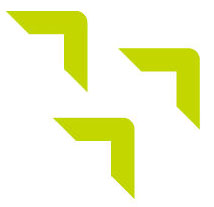
Enterprise resource planning (ERP) is the integrated management of main business processes, often in real time and mediated by software and technology.
Data mining is a process of discovering patterns in large data sets involving methods at the intersection of machine learning, statistics, and database systems. Data mining is an interdisciplinary subfield of computer science and statistics with an overall goal to extract information from a data set and transform the information into a comprehensible structure for further use. Data mining is the analysis step of the "knowledge discovery in databases" process, or KDD. Aside from the raw analysis step, it also involves database and data management aspects, data pre-processing, model and inference considerations, interestingness metrics, complexity considerations, post-processing of discovered structures, visualization, and online updating.
Knowledge management (KM) is the process of creating, sharing, using and managing the knowledge and information of an organization. It refers to a multidisciplinary approach to achieve organisational objectives by making the best use of knowledge.
Documentation is any communicable material that is used to describe, explain or instruct regarding some attributes of an object, system or procedure, such as its parts, assembly, installation, maintenance and use. Documentation can be provided on paper, online, or on digital or analog media, such as audio tape or CDs. Examples are user guides, white papers, online help, and quick-reference guides. Paper or hard-copy documentation has become less common. Documentation is often distributed via websites, software products, and other online applications.
Organizational learning is the process of creating, retaining, and transferring knowledge within an organization. An organization improves over time as it gains experience. From this experience, it is able to create knowledge. This knowledge is broad, covering any topic that could better an organization. Examples may include ways to increase production efficiency or to develop beneficial investor relations. Knowledge is created at four different units: individual, group, organizational, and inter organizational.
A management information system (MIS) is an information system used for decision-making, and for the coordination, control, analysis, and visualization of information in an organization.
Information management (IM) concerns a cycle of organizational activity: the acquisition of information from one or more sources, the custodianship and the distribution of that information to those who need it, and its ultimate disposition through archiving or deletion.

A concept map or conceptual diagram is a diagram that depicts suggested relationships between concepts. Concept maps may be used by instructional designers, engineers, technical writers, and others to organize and structure knowledge.
Knowledge workers are workers whose main capital is knowledge. Examples include programmers, physicians, pharmacists, architects, engineers, scientists, design thinkers, public accountants, lawyers, and academics, and any other white-collar workers, whose line of work requires one to "think for a living".
Adaptive management (AM), also known as adaptive resource management (ARM) or adaptive environmental assessment and management (AEAM), is a structured, iterative process of robust decision making in the face of uncertainty, with an aim to reducing uncertainty over time via system monitoring. In this way, decision making simultaneously meets one or more resource management objectives and, either passively or actively, accrues information needed to improve future management. Adaptive management is a tool which should be used not only to change a system, but also to learn about the system. Because adaptive management is based on a learning process, it improves long-run management outcomes. The challenge in using the adaptive management approach lies in finding the correct balance between gaining knowledge to improve management in the future and achieving the best short-term outcome based on current knowledge. This approach has more recently been employed in implementing international development programs.
Educational technology is the combined use of computer hardware, software, and educational theory and practice to facilitate learning. Educational technology creates, uses, and manages technological processes and educational resources to help improve user academic performance.
Personal knowledge networks have been primarily conceived by researchers with regard to the inter-firm knowledge sources between organisations, where networks are informal and personal. Instead of looking at the organisational context, some researchers investigate the intra-firm aspects at personal level of organisational knowledge networks, where knowledge management processes start and end. Various technologies and behaviours support personal knowledge networking for example wikis, Really Simple Syndication (RSS) and relationship networks. Interest is also being driven by the realization that KM can happen without a lot of explicit governance. This trend is called "grass-roots KM" as opposed to traditional, top-down enterprise KM.
Maturity is a measurement of the ability of an organization for continuous improvement in a particular discipline. The higher the maturity, the higher will be the chances that incidents or errors will lead to improvements either in the quality or in the use of the resources of the discipline as implemented by the organization.

SAP SuccessFactors is an American multinational company headquartered in South San Francisco, California, providing cloud-based software for human capital management using the Software as a service (SaaS) model.
Computers and software have been used in dental medicine since the 1960s. Since then, computers and information technology have spread progressively in dental practice. According to one study, in 2000, 85.1% of all dentists in the United States were using computers.

SumTotal Systems, Inc. is a software company based in Gainesville, Florida that provides human resource management software and services to private and public sector organizations. The company uses multiple cloud-based channels, including Software as a Service (SaaS), Hosted Subscription, and premises-based licensure. The company has regional offices in the US, Canada, Europe, and the Asia-Pacific region.
Communities that support innovation have been referred to as communities of innovation (CoI), communities for innovation, innovation communities, open innovation communities, and communities of creation.
Visionary Integration Professionals, LLC (VIP), is headquartered in Folsom, California, with additional offices in Reston, Virginia. VIP was established as a single-employee company by CEO Jonna Ward on February 29, 1996, and now has approximately 700 staff members who provide consulting support to federal, state, and local government agencies, as well as various commercial sector industries. VIP has three core service offerings: Management Consulting, Technology Integration, and Learning.
Information technology (IT) is the use of computers to store, retrieve, transmit, and manipulate data or information. IT is typically used within the context of business operations as opposed to personal or entertainment technologies. IT is considered to be a subset of information and communications technology (ICT). An information technology system is generally an information system, a communications system, or, more specifically speaking, a computer system – including all hardware, software, and peripheral equipment – operated by a limited group of users.
Blackboard Inc. is an American educational technology company with corporate headquarters in Washington, D.C.. It is known for Blackboard Learn, a learning management system.



